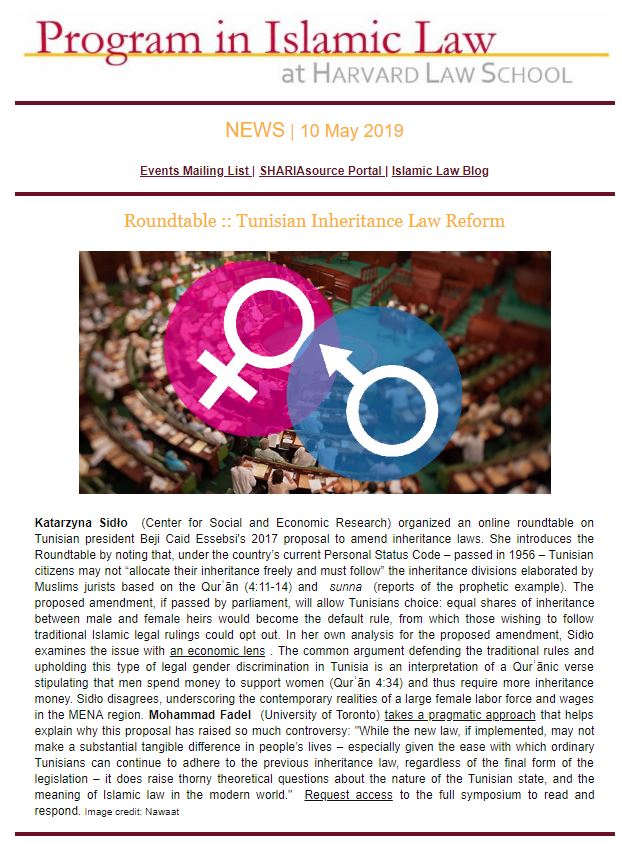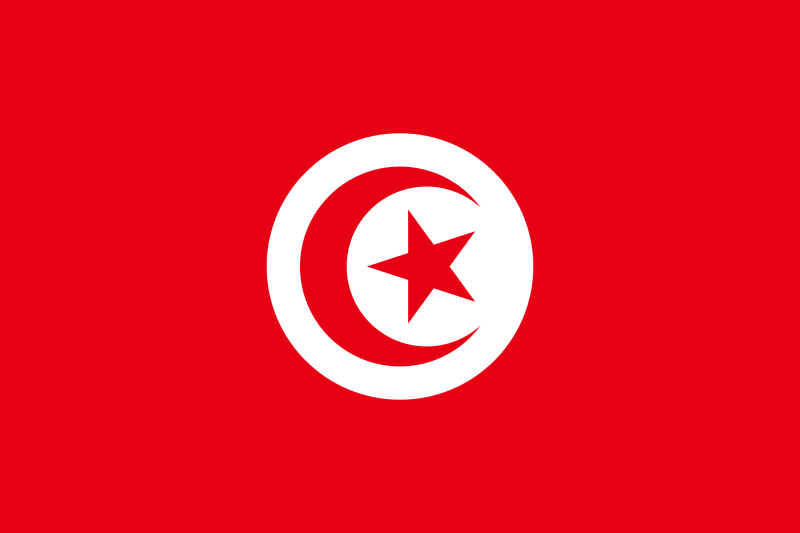
 Roundtable :: Tunisian Inheritance Law Reform Katarzyna Sidło (Center for Social and Economic Research) organized an online roundtable on Tunisian president Beji Caid Essebsi’s 2017 proposal to amend inheritance laws. She introduces the Roundtable by noting that, under the country’s current Personal Status Code – passed in 1956 – Tunisian citizens may not “allocate their inheritance freely and must follow” the inheritance divisions elaborated by Muslims jurists based on the Qurʾān (4:11-14) and sunna (reports of the prophetic example). The proposed amendment, if passed by parliament, will allow Tunisians choice: equal shares of inheritance between male and female heirs would become the default rule, from which those wishing to follow traditional Islamic legal rulings could opt out. In her own analysis for the proposed amendment, Sidło examines the issue with an economic lens . The common argument defending the traditional rules and upholding this type of legal gender discrimination in Tunisia is an interpretation of a Qurʾānic verse stipulating that men spend money to support women (Qurʾān 4:34) and thus require more inheritance money. Sidło disagrees, underscoring the contemporary realities of a large female labor force and wages in the MENA region. Mohammad Fadel (University of Toronto) takes a pragmatic approach that helps explain why this proposal has raised so much controversy: “While the new law, if implemented, may not make a substantial tangible difference in people’s lives – especially given the ease with which ordinary Tunisians can continue to adhere to the previous inheritance law, regardless of the final form of the legislation – it does raise thorny theoretical questions about the nature of the Tunisian state, and the meaning of Islamic law in the modern world.” Request access to the full symposium to read and respond. Image credit: Nawaat
Roundtable :: Tunisian Inheritance Law Reform Katarzyna Sidło (Center for Social and Economic Research) organized an online roundtable on Tunisian president Beji Caid Essebsi’s 2017 proposal to amend inheritance laws. She introduces the Roundtable by noting that, under the country’s current Personal Status Code – passed in 1956 – Tunisian citizens may not “allocate their inheritance freely and must follow” the inheritance divisions elaborated by Muslims jurists based on the Qurʾān (4:11-14) and sunna (reports of the prophetic example). The proposed amendment, if passed by parliament, will allow Tunisians choice: equal shares of inheritance between male and female heirs would become the default rule, from which those wishing to follow traditional Islamic legal rulings could opt out. In her own analysis for the proposed amendment, Sidło examines the issue with an economic lens . The common argument defending the traditional rules and upholding this type of legal gender discrimination in Tunisia is an interpretation of a Qurʾānic verse stipulating that men spend money to support women (Qurʾān 4:34) and thus require more inheritance money. Sidło disagrees, underscoring the contemporary realities of a large female labor force and wages in the MENA region. Mohammad Fadel (University of Toronto) takes a pragmatic approach that helps explain why this proposal has raised so much controversy: “While the new law, if implemented, may not make a substantial tangible difference in people’s lives – especially given the ease with which ordinary Tunisians can continue to adhere to the previous inheritance law, regardless of the final form of the legislation – it does raise thorny theoretical questions about the nature of the Tunisian state, and the meaning of Islamic law in the modern world.” Request access to the full symposium to read and respond. Image credit: Nawaat
 Country Profile on Tunisia The SHARIAsource Portal’s Country Profiles aim to facilitate research for Islamic law and comparative law scholars by detailing the history, role, and source of Islamic and other state laws in each country. The Tunisian Country Profile provides sources on the larger context of the Tunisian legal system, along with expert analyses on the religion-state divide in the MENA region. See the Tunisia Country Profile (in the Country Profiles Special Collection). Image credit: AliExpress
Country Profile on Tunisia The SHARIAsource Portal’s Country Profiles aim to facilitate research for Islamic law and comparative law scholars by detailing the history, role, and source of Islamic and other state laws in each country. The Tunisian Country Profile provides sources on the larger context of the Tunisian legal system, along with expert analyses on the religion-state divide in the MENA region. See the Tunisia Country Profile (in the Country Profiles Special Collection). Image credit: AliExpress
Spotlight :: Gender and InheritanceSHARIAsource houses a number of primary sources and expert analysis on laws concerning gender and inheritance in the Muslim world, outside of Tunisia. A search of laws on gender and inheritance shows that each manifests in legal structures and proceedings differently. For some examples, see Pakistan’s 2006 Protection of Women Act , various court cases from Indonesia, and an earlier symposium presenting perspectives from Chinese Muslim legal scholars on female clerics. Image credit: Our World in Data. Image credit: Our World in Data
See the full newsletter.

